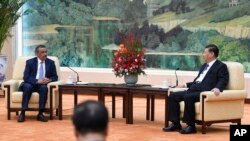The World Health Organization warns the evacuation of nationals from China to their home countries carries the risk of spreading the deadly coronavirus. The WHO reports 4,428 cases of the disease in China, including 106 deaths. Another 45 cases are confirmed in 13 countries.
WHO Chief Tedros Adhanom Ghebreyesus is wrapping up several days of talks with China’s President Xi Jinping and other high-level officials in Beijing. They have been discussing measures to protect the health of Chinese citizens and foreigners during the coronavirus outbreak.
WHO spokesman Christian Lindmeier says officials also have considered possible alternatives to the evacuation of foreigners from China to ensure no infections are imported back to their home countries.
He calls that a real possibility as the incubation period of the coronavirus is between one and 14 days. That means people can transmit the virus during that period.
"There are possibilities that also asymptomatic people, people showing no symptoms at all, could be infectious, are definitely interesting and concerning and have to be closer looked at," he said. "That is all I can say so far… It is one of the big unknowns about this virus, which has to be solved.”
Lindmeier tells VOA that the WHO does not yet have a position on the pros and cons of quarantining nationals upon their return. He says the WHO is waiting for clarification on the dangers of transmitting the disease during the incubation period before issuing advice.
"Closely monitoring or even isolating people who are coming back might be a measure yet if we see symptoms," he said. "Monitoring, closely monitoring or, as some countries refer to isolating them even for a certain amount of time is a measure possible. It could help the scenario… prevent the further spread of the virus.”
The good news says Lindmeier is that there has not been any major spread of the infection outside of China.
The WHO’s latest risk assessment of the coronavirus rates the regional and global risk level as high, and that of China as very high. While the virus is not rapidly spreading outside of China, the WHO urges countries to remain vigilant and be prepared.




